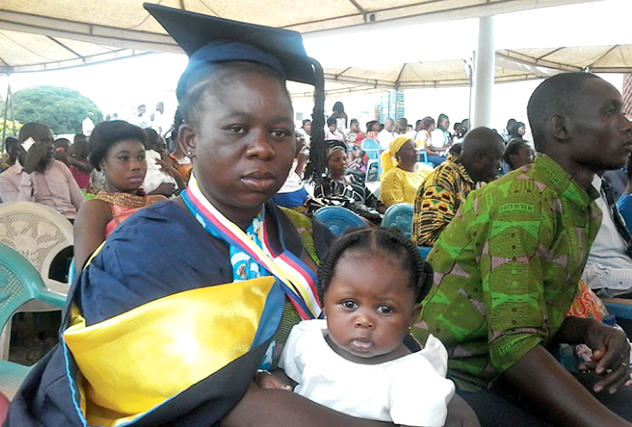
Mothers and babies with degrees
The resilience of women is told in many ways in many stories. Their determination to survive and thrive in a fast-advancing global world where the tide has for long been against them is oft times amazing.
They are not ready to stop. The strength of women in both rural and urban communities across the world, on the African continent and in Ghana in particular resonates in huts of the Northern Region, in communities in the Volta and Central regions and in higher circles of governance, law-making institutions, the judiciary, health and education sectors in the capital, Accra.
Women all over the world in all continents are ready to embrace change for the good of their families and communities.
This is another story of a woman’s determination and commitment to change her world one day at a time.
She is doing it, still maintaining her natural traditional position as a wife and mother and ready for all the challenges that come with this journey of change.
Ms Cynthia Lamisi Ali is 29 and a mother of two. She works as a data entry officer with the National Health Insurance Scheme in the Northern Region of Ghana.
According to her, she decided to continue her education for many reasons.
“I can get a better job. I can also get an increase in salary and promotion at work,” she said.
Most importantly, Lamisi said she wanted to be an example for her girls. “It’s important to tell them nothing changes because I am a woman and that all things are possible for them. By accessing higher education, I believe I can make for them a better mother and a better home,” she said.
Ms Lamisi enrolled on a three-year degree programme in Business Management Studies with the University of Cape Coast (UCC) College of Distance Education (CODE).
The challenges
Ms Lamisi endured all; maintaining a home as a wife and mother and attending lectures.
Then in her final year, she got pregnant again with her second baby.
She said pregnancy and nursing a baby while studying and working was not easy.
“To say it has not been easy is an understatement,” she said. “Usually, you would have to take care of the home and a child while others studied. I remember the last semester examination when I really needed to go for a group discussion but could not go because my child was not too well.
“I really like studying in the library but that has been almost impossible with my baby,” she added.
When asked about going for lectures, she said it did not come easy. According to her, she went to lectures with a baby sitter who sat outside the lecture hall with the baby.
“If she cries, I am alerted and I go out of the lecture theatre to breastfeed her; and you are likely to miss something important as you breastfeed intermittently during lectures,” she mentioned.
The journey to the certificate
“The hard work and school is over, at least for now,” Ms Lamisi said.
On March 12, 2017, Ms Lamisi embarked on another journey; this time to receive congratulations for a job well done and “a handshake” for her determination and hard work.
She and her six-month old baby set off on an 11-hour journey from Bunkprugu in the Bunkprugu Yooyoo District in the Northern Region of Ghana to Cape Coast in the Central Region for the graduation.
Ms Lamisi said she set off at 2 a.m. from Bunkprugu and arrived at 3 p.m. in Kumasi to meet her husband who works in Kumasi. At 5 a.m. on Monday, she, together with her husband and baby set off from Kumasi to Cape Coast for her graduation.
Last Tuesday, Ms Lamisi sat with her baby on her lap outside the graduation hall to breastfeed her. She took a handkerchief from her bag and wiped the beads of sweat on the little girl’s face before throwing her up playfully in the air as if to say, “Congratulations, we made it.”
"We all took the course and we all share the joy," she said.
At this year's graduation, scores of nursing mothers carried their babies shoulder high to receive their certificates, telling vividly the story of women and mothers seeking higher education. The babies came too to take the certificates with their mothers.
CODE, UCC and female education
The UCC CODE has over the years consciously worked to get many women on the distance education programme for many laudable reasons.
The college has admitted many women to get them to attain higher education.
This academic year, the college admitted 7,663 females, representing about 45.9 per cent of the total admission figure.
Significantly, it represents a 2.4 per cent increase over last year’s figure of 43.5 per cent.
The Vice Chancellor of UCC, Professor Joseph Ghartey Ampiah, noted that the high female ratio meant that the male to female ratio of 50:50 was close to being achieved.
The Future
The degree is not the end for Ms Lamisi, despite the challenges. She hopes to pursue her master’s degree soon, saying; “No shaking.”
“But this one I have to plan carefully, but definitely I will do my master’s, maybe after the third child,” she said with a smile. “You can’t just sit around doing nothing,” she added.
Education continues to be a tool for social, economic and political development, empowering women to optimise their potentials and change their world.
